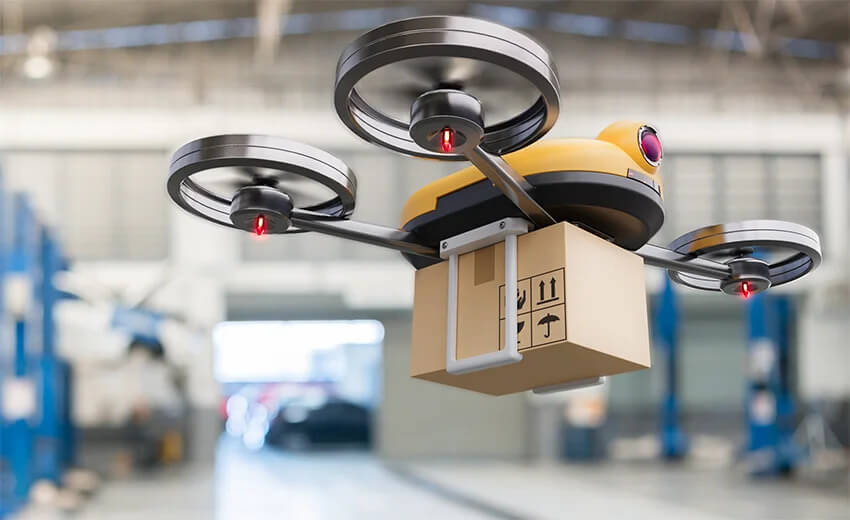
Revolutionizing Logistics: The Future of Drone Freight in Expedited Transport Solutions
In the era of technological innovation, drone freight emerges as a groundbreaking solution, redefining the landscape of logistics with its agility, speed, and eco-friendly attributes. This comprehensive exploration delves into the intricacies of drone freight, shedding light on its advantages, considerations, and the transformative role it may play in the movers and packers industry.
1. Introduction to Drone Freight:
Drone freight, also known as unmanned aerial vehicle (UAV) freight, involves the use of autonomous aircraft to transport goods. This cutting-edge technology is transforming the traditional paradigms of logistics, offering a swift and efficient alternative for the transportation of goods.
2. Advantages of Drone Freight:
Unparalleled Speed: Drones operate at high speeds, providing an unprecedented level of efficiency in cargo transportation. This rapid transit is particularly advantageous for time-sensitive deliveries, offering a solution that outpaces traditional transportation modes.
Reduced Carbon Footprint: Drone freight is inherently more eco-friendly compared to traditional freight methods. With electric or low-emission propulsion systems, drones contribute to reducing the carbon footprint associated with cargo transportation, aligning with sustainability goals.
Accessibility to Remote Areas: Drones excel in reaching remote or difficult-to-access locations. This makes them an ideal choice for delivering goods to areas with challenging terrains, where traditional transportation infrastructure may be limited.
3. Types of Drone Freight Services:
Point-to-Point Delivery: Direct transportation from one location to another, bypassing traditional routes and infrastructure.
Last-Mile Delivery: Drones excel in last-mile delivery, navigating congested urban areas to deliver parcels directly to the recipient’s doorstep.
4. Considerations for Drone Freight in the Moving Industry:
Payload Capacity: While drone technology continues to advance, payload capacity remains a consideration. Movers and packers must assess the weight and volume of cargo to ensure compatibility with drone capabilities.
Regulatory Compliance: The use of drones in freight is subject to evolving regulations. Movers and packers must stay informed about local and international regulations governing drone operations to ensure compliance and a seamless logistics process.
Weather Conditions: Drones may be sensitive to adverse weather conditions, such as strong winds or heavy rainfall. Monitoring weather forecasts and implementing contingency plans is crucial to mitigate potential disruptions in drone freight operations.
5. Technological Advancements in Drone Freight:
Automated Navigation Systems: Drones are equipped with advanced navigation systems, utilizing GPS and obstacle avoidance technology to autonomously navigate through various terrains and obstacles.
Real-Time Tracking: Technology enables real-time tracking of drone shipments, providing transparency and visibility throughout the delivery process for both movers and clients.
6. Insurance and Risk Mitigation:
Given the innovative nature of drone freight, insurance considerations are paramount. Movers and packers must collaborate with insurance providers to establish comprehensive coverage, addressing potential risks such as accidents, technical malfunctions, or theft during drone transportation.
7. Partnering with a Reliable Drone Freight Provider:
Choosing a reputable drone freight partner is essential for successful logistics operations. Movers and packers benefit from collaborating with experienced providers that prioritize safety, adherence to regulations, and the reliability of drone technology.
8. Regulatory Compliance:
Drone freight operations are subject to evolving regulations that vary across jurisdictions. Movers and packers must navigate these regulations and stay abreast of updates to ensure compliance and seamless integration of drone freight into their logistics strategies.
9. The Future of Drone Freight:
As technology continues to advance, the future of drone freight holds immense potential. Innovations such as extended flight ranges, increased payload capacities, and expanded regulatory frameworks may position drone freight as a mainstream and indispensable component of the movers and packers industry.
10. Conclusion:
In conclusion, drone freight represents a paradigm shift in the movers and packers industry, offering a revolutionary approach to cargo transportation. Its speed, reduced environmental impact, and accessibility to remote areas make it a promising solution for the future of logistics. While still evolving, the integration of drone freight into the movers and packers toolkit may usher in a new era of expedited, sustainable, and technologically advanced cargo transportation. Choosing a forward-thinking and reliable drone freight partner is key to harnessing the full potential of this transformative logistics solution.
